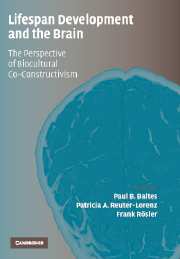Book contents
- Frontmatter
- Contents
- List of Contributors
- Preface and Acknowledgments
- Lifespan Development and the Brain
- PART ONE SETTING THE STAGE ACROSS THE AGES OF THE LIFESPAN
- PART TWO NEURONAL PLASTICITY AND BIOCULTURAL CO-CONSTRUCTION: MICROSTRUCTURE MEETS THE EXPERIENTIAL ENVIRONMENT
- PART THREE NEURONAL PLASTICITY AND BIOCULTURAL CO-CONSTRUCTION: ATYPICAL BRAIN ARCHITECTURES
- PART FOUR BIOCULTURAL CO-CONSTRUCTION: SPECIFIC FUNCTIONS AND DOMAINS
- PART FIVE PLASTICITY AND BIOCULTURAL CO-CONSTRUCTION IN LATER LIFE
- 11 Influences of Biological and Self-Initiated Factors on Brain and Cognition in Adulthood and Aging
- 12 The Aging Mind and Brain: Implications of Enduring Plasticity for Behavioral and Cultural Change
- PART SIX BIOCULTURAL CO-CONSTRUCTION: FROM MICRO- TO MACROENVIRONMENTS IN LARGER CULTURAL CONTEXTS
- PART SEVEN EPILOGUE
- Author Index
- Subject Index
- References
11 - Influences of Biological and Self-Initiated Factors on Brain and Cognition in Adulthood and Aging
Published online by Cambridge University Press: 17 July 2009
- Frontmatter
- Contents
- List of Contributors
- Preface and Acknowledgments
- Lifespan Development and the Brain
- PART ONE SETTING THE STAGE ACROSS THE AGES OF THE LIFESPAN
- PART TWO NEURONAL PLASTICITY AND BIOCULTURAL CO-CONSTRUCTION: MICROSTRUCTURE MEETS THE EXPERIENTIAL ENVIRONMENT
- PART THREE NEURONAL PLASTICITY AND BIOCULTURAL CO-CONSTRUCTION: ATYPICAL BRAIN ARCHITECTURES
- PART FOUR BIOCULTURAL CO-CONSTRUCTION: SPECIFIC FUNCTIONS AND DOMAINS
- PART FIVE PLASTICITY AND BIOCULTURAL CO-CONSTRUCTION IN LATER LIFE
- 11 Influences of Biological and Self-Initiated Factors on Brain and Cognition in Adulthood and Aging
- 12 The Aging Mind and Brain: Implications of Enduring Plasticity for Behavioral and Cultural Change
- PART SIX BIOCULTURAL CO-CONSTRUCTION: FROM MICRO- TO MACROENVIRONMENTS IN LARGER CULTURAL CONTEXTS
- PART SEVEN EPILOGUE
- Author Index
- Subject Index
- References
Summary
ABSTRACT
Age-related memory deficits are most pronounced on demanding tests of working memory and episodic memory, and are more pronounced in some older individuals than in others. In this chapter, we review individual-difference factors that influence memory functioning in adulthood and aging. A distinction is drawn between two categories of factors. The first includes biological factors that impose constraints by predisposing the aging brain toward cognitive decline. The second category includes a more heterogeneous collection of factors that are self-initiated and may be seen as offering possibilities rather than imposing constraints. We conclude by presenting some intriguing avenues for future research.
INTRODUCTION
Increasing age leads to impaired memory function. Although this bold and perhaps depressing opening statement has been supported by numerous empirical observations, it has to be qualified in several ways. First, all memory functions are not uniformly affected by aging. In the domain of short-term working memory, age differences are modest on tasks that involve the passive holding of information over some restricted time period, whereas tasks that more heavily tax executive processes by requiring both holding and manipulation of memory information are associated with much more pronounced age differences. Within the domain of long-term memory, declarative (i.e., episodic and semantic) memory is more age sensitive than nondeclarative (i.e., procedural) memory. Also, within declarative memory, aging seems to have quite differential effects (e.g., Nyberg, Maitland et al., 2003; Fig. 11.1).
Information
- Type
- Chapter
- Information
- Lifespan Development and the BrainThe Perspective of Biocultural Co-Constructivism, pp. 239 - 254Publisher: Cambridge University PressPrint publication year: 2006
References
Accessibility standard: Unknown
Why this information is here
This section outlines the accessibility features of this content - including support for screen readers, full keyboard navigation and high-contrast display options. This may not be relevant for you.Accessibility Information
- 1
- Cited by
